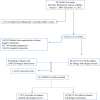Dengue during pregnancy and live birth outcomes: a cohort of linked data from Brazil
- PMID: 31345962
- PMCID: PMC6661644
- DOI: 10.1136/bmjopen-2018-023529
Dengue during pregnancy and live birth outcomes: a cohort of linked data from Brazil
Abstract
Objectives: Dengue is the most common viral mosquito-borne disease, and women of reproductive age who live in or travel to endemic areas are at risk. Little is known about the effects of dengue during pregnancy on birth outcomes. The objective of this study is to examine the effect of maternal dengue severity on live birth outcomes.
Design and setting: We conducted a population-based cohort study using routinely collected Brazilian data from 2006 to 2012.
Participating: We linked birth registration records and dengue registration records to identify women with and without dengue during pregnancy. Using multinomial logistic regression and Firth method, we estimated risk and ORs for preterm birth (<37 weeks' gestation), low birth weight (<2500 g) and small for gestational age (<10thcentile). We also investigated the effect of time between the onset of the disease and each outcome.
Results: We included 16 738 000 live births. Dengue haemorrhagic fever was associated with preterm birth (OR=2.4; 95% CI 1.3 to 4.4) and low birth weight (OR=2.1; 95% CI 1.1 to 4.0), but there was no evidence of effect for small for gestational age (OR=2.1; 95% CI 0.4 to 12.2). The magnitude of the effects was higher in the acute disease period.
Conclusion: This study showed an increased risk of adverse birth outcomes in women with severe dengue during pregnancy. Medical intervention to mitigate maternal risk during severe acute dengue episodes may improve outcomes for infants born to exposed mothers.
Keywords: birth outcomes; dengue; pregnancy.
© Author(s) (or their employer(s)) 2019. Re-use permitted under CC BY. Published by BMJ.
Conflict of interest statement
Competing interests: None declared.
Figures
References
-
- World Health Organization. Dengue and severe dengue WHO Fact Sheet No117. 2017. http://www.who.int/mediacentre/factsheets/fs117/en/ (Accessed 4 May 2017).
-
- Restrepo BN, Isaza DM, Salazar CL, et al. Dengue y embarazoen antioquia, Colombia. Revista Facultad Nacional de Salud Pública 2004;22:7–14.
Publication types
MeSH terms
Grants and funding
LinkOut - more resources
Full Text Sources
Medical

